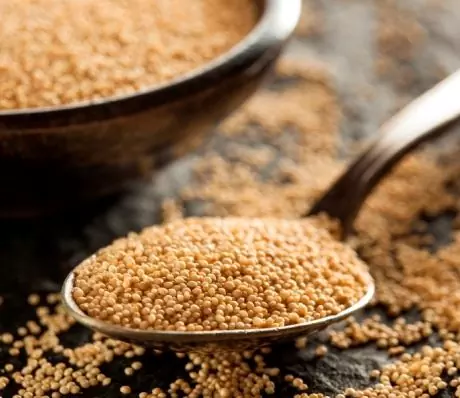- Author Rachel Wainwright wainwright@abchealthonline.com.
- Public 2023-12-15 07:39.
- Last modified 2025-11-02 20:14.
Grapes
Grapes are among the oldest cultivated plants on earth. Numerous hundreds of varieties, this plant in its chemical composition, to a greater or lesser extent, contains many irreplaceable nutrients that make it not only tasty, but also a necessary product in the diet.
The ratio of BJU in the product

Source: depositphotos.com How to burn 67 kcal?
| Walking | 17 minutes |
| Jogging | 7 minutes |
| Swimming | 6 minutes |
| A bike | 10 min. |
| Aerobics | 13 minutes |
| Household chores | 22 minutes |
Useful properties of grapes
The main nutritional value and taste of grapes is determined by the presence of sugars in it. They make up from 12 to 30% of the mass of grape fruits and are presented in the form of fructose, sucrose and glucose. Unlike beet sugar, natural sugars are quite safe for your health. Entering immediately into the bloodstream, they contribute to the rapid restoration of human health and strength and activate brain activity.
Also, grapes contain a large amount of vitamins necessary for a person. Most of them are vitamin C, which actively affects the protective functions of the body. The composition of grapes also contains vitamins of group B, provitamin A, vitamins PP, P and K and folic acid.
Grapes contain up to 6% organic acids, most of which are malic acid. Also, the fruit contains gluconic, formic, tartaric, phosphoric, citric, succinic and oxalic acids.
Studies by American scientists have shown that grapes protect the retina of the eyes from oxidative stress, thereby being an excellent means of preventing age-related eye diseases that lead to decreased vision over time.
The list of useful properties of grapes is supplemented by almost all mineral salts and trace elements necessary for the human body. Most of all, the berries contain potassium, which allows the use of grapes for the prevention of cardiovascular diseases and kidney diseases. The plant also contains magnesium, manganese, nickel, silicon, cobalt, aluminum, boron, zinc, chromium and other trace elements, which are often structural elements of vitamins, hormones, enzymes, proteins and a number of important organic complexes.
Useful trace elements are found not only in the juice of berries, but also in the skin and seeds. So, in the skin of berries there are essential oils, anthocyanins, tannins and pectin substances. The seeds contain tannins and fatty oil.
For medicinal purposes, you can eat fresh, dried, and also processed in the form of juice, syrups, vinegar or wine grapes.
It is useful to drink grape juice in case of nervous exhaustion and loss of strength. A glass of red grape juice replenishes your daily intake of vitamin B, which helps you more easily withstand stress, while also lowering blood cholesterol and improving brain function.
In a word, the effect on the body consists of the totality of all the beneficial properties of grapes, due to which metabolic processes are revived, the immune system is strengthened and various diseases of the liver, stomach, heart, intestines, hematopoietic system and lungs are cured.
The use of grapes
It is recommended to eat grapes separately from other meals. Eating it along with other foods, fruits, vegetables and alcoholic beverages can lead to increased fermentation and digestive upset.
To prevent the development of anemia, rickets, as well as to treat pulmonary tuberculosis, gastrointestinal diseases, scurvy, gout, heart and kidney diseases, it is recommended to drink at least a glass of grape juice per day. In this case, it is better to give preference to red grape varieties, since they contain more potassium and vitamin C than white ones.
As an antitussive and expectorant for colds and lung diseases, you can prepare a decoction of raisins, for which 100 g of raisins are boiled in 1 glass of water for 10 minutes. Take half a glass up to four times a day. The medicinal effect of the broth can be enhanced with onion juice.
In winter, grapes are eaten dried or drunk from it to increase the body's defenses. To strengthen the immune system in winter, tea can be made from grapes, for which 250 g of raisins are poured with three glasses of water, 1 teaspoon of molasses is added, mixed and, covered with a lid, infused for an hour. The resulting drink is stored in the refrigerator and drunk 200-250 g daily.
Grapes are a valuable dietary food. Grape mono-diet for 3-4 days allows not only to lose a couple of extra pounds, but also to improve the state of the circulatory system, normalize the composition of gastric juice, enhance kidney function, remove toxins from the body, improve food absorption and heart function.
Since grapes accelerate tooth decay from tooth decay, it is recommended that you rinse your mouth thoroughly with a mild baking soda solution after taking fresh grapes or juice.

Baths with grape leaves are used to strengthen the walls of blood vessels. The leaves also have antioxidant properties and help eliminate toxins. Often they are successfully used in the form of infusions for cleansing the body and treating cellulite.
Grapes have long been used in cosmetology, due to the properties of fruit acids to affect wrinkles. Grape pulp, which contains a mixture of glycolic, tartaric and malic acids, supplies the skin with moisture, smoothes it, and also promotes the separation of dead skin particles and stimulates the formation of collagen.
Natural acids allow the use of grapes for cosmetic purposes for skin prone to allergic reactions.
Contraindications
With diabetes and obesity, it is not recommended to eat grapes in large quantities because of its high calorie content and high glucose content.
It is also not recommended to eat fresh grapes or raisins in case of digestive disorders, during an exacerbation of gastric ulcer and duodenal ulcer, with colitis and potassium metabolism disorders. Before eating large amounts of grapes, you need to make sure that they do not cause allergies. This warning especially applies to children, who are more likely than adults to be prone to allergic reactions.
YouTube video related to the article:
Found a mistake in the text? Select it and press Ctrl + Enter.






